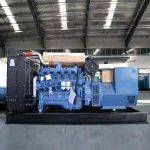Introduction
Humidity testing is a crucial process in various industries, including aerospace, electronics, automotive, and pharmaceuticals. Maintaining precise humidity levels is essential to ensure the quality and reliability of products, as well as to comply with industry standards and regulations. One of the key components in humidity testing setups is a reliable power source, and diesel generators have proven to be a popular choice for this purpose. In this article, we will explore the importance of humidity testing, the role of diesel generators in humidity testing setups, their advantages, considerations for choosing the right diesel generator, and best practices for integrating them into humidity testing systems.
Importance of Humidity Testing
Humidity testing, also known as environmental testing, involves subjecting products or materials to controlled levels of humidity to assess their performance under different environmental conditions. Humidity testing is essential for various reasons:
1. Quality Assurance: Humidity testing helps manufacturers ensure that their products can withstand real-world conditions, including high humidity levels, without compromising performance or reliability.
2. Compliance: Many industries have specific standards and regulations regarding humidity levels, and humidity testing is necessary to demonstrate compliance with these requirements.
3. Reliability: By conducting humidity testing, manufacturers can identify potential weaknesses in their products and make improvements to enhance their reliability and longevity.
4. Research and Development: Humidity testing is often used in research and development to study the effects of humidity on new materials or products and to optimize their performance under different environmental conditions.
Role of Diesel Generators in Humidity Testing
Diesel generators play a crucial role in humidity testing setups by providing a reliable and uninterrupted power supply to the testing equipment. Here are some key reasons why diesel generators are commonly used in humidity testing applications:
1. Reliability: Diesel generators are known for their robustness and reliability, making them ideal for providing continuous power supply during prolonged humidity testing cycles.
2. Fuel Efficiency: Diesel generators are more fuel-efficient compared to other types of generators, which is important for long-duration humidity testing applications.
3. Power Output: Diesel generators are capable of providing high power output, which is essential for running multiple humidity chambers and other testing equipment simultaneously.
4. Durability: Diesel generators are designed to withstand harsh environmental conditions, making them suitable for use in humidity testing facilities where temperature and humidity levels can vary.
Advantages of Using Diesel Generators for Humidity Testing
There are several advantages to using diesel generators for humidity testing applications:
1. Continuous Power Supply: Diesel generators can provide uninterrupted power supply, ensuring that humidity testing processes are not disrupted due to power outages or fluctuations.
2. Cost-Effectiveness: Diesel fuel is generally more cost-effective compared to other fuel sources, making diesel generators a cost-efficient option for long-term humidity testing operations.
3. Low Maintenance: Diesel generators are known for their durability and require minimal maintenance, reducing downtime and overall operating costs.
4. Portability: Diesel generators are available in a wide range of sizes and configurations, making them suitable for both stationary and portable humidity testing setups.
Considerations for Choosing the Right Diesel Generator
When selecting a diesel generator for humidity testing applications, several factors should be taken into consideration to ensure optimal performance and reliability:
1. Power Requirements: Calculate the total power requirements of all the humidity chambers and testing equipment to determine the appropriate power output of the diesel generator.
2. Fuel Efficiency: Consider the fuel consumption rate of the diesel generator to minimize operating costs over the long term.
3. Emissions: Ensure that the diesel generator complies with environmental regulations regarding emissions to minimize the impact on the surrounding environment.
4. Noise Levels: Choose a diesel generator with low noise levels to create a comfortable working environment in the humidity testing facility.
5. Size and Portability: Select a diesel generator that is appropriately sized for the available space and can be easily transported if needed for portable testing setups.
https://www.lkpowerplant.com for Integrating Diesel Generators into Humidity Testing Systems
To maximize the effectiveness of diesel generators in humidity testing setups, consider the following best practices:
1. Regular Maintenance: Schedule routine maintenance checks and servicing of the diesel generator to ensure optimal performance and reliability.
2. Fuel Management: Monitor fuel levels and consumption to avoid unexpected shutdowns during humidity testing cycles.
3. Backup Systems: Implement backup power sources or emergency plans in case of generator failure to prevent data loss or equipment damage.
4. Monitoring and Control: Use advanced monitoring and control systems to track power output, fuel consumption, and generator performance in real-time.
5. Safety Precautions: Follow safety guidelines and protocols when operating diesel generators to prevent accidents and ensure the well-being of personnel working in the humidity testing facility.
Conclusion
Diesel generators play a vital role in humidity testing setups by providing a reliable and continuous power supply to testing equipment. Their robustness, reliability, and cost-effectiveness make them a preferred choice for industries that require precise humidity control for product testing and research purposes. By considering key factors such as power requirements, fuel efficiency, emissions, and maintenance, businesses can select the right diesel generator for their humidity testing needs. Integrating diesel generators into humidity testing systems following best practices ensures smooth operations and accurate testing results, ultimately leading to improved product quality and reliability in various industries.


0no comments yet